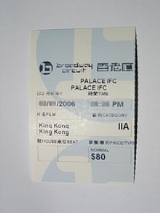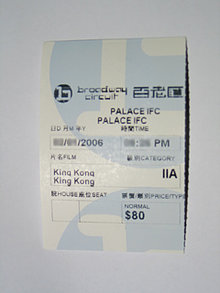
Hong Kong motion picture rating system
Encyclopedia

Motion picture rating system
A motion picture rating system is designated to classify films with regard to suitability for audiences in terms of issues such as sex, violence, substance abuse, profanity, impudence or other types of mature content...
. An official government agency issues ratings for any movie that will be shown in Hong Kong
Hong Kong
Hong Kong is one of two Special Administrative Regions of the People's Republic of China , the other being Macau. A city-state situated on China's south coast and enclosed by the Pearl River Delta and South China Sea, it is renowned for its expansive skyline and deep natural harbour...
movie theatres.
History
At the beginning of the film industry in Hong KongCinema of Hong Kong
The cinema of Hong Kong is one of the three major threads in the history of Chinese language cinema, alongside the cinema of China, and the cinema of Taiwan...
, when the viewing of movies had no age restrictions, films were made under strict guidelines. For instance, movie characters were not allowed to get away with crimes, and sex scenes were not permitted. In 1986, with the release of John Woo
John Woo
John Woo Yu-Sen SBS is a Hong Kong-based film director and producer. Recognized for his stylised films of highly choreographed action sequences, Mexican standoffs, and use of slow-motion, Woo has directed several notable Hong Kong action films, among them, A Better Tomorrow, The Killer, Hard...
's violent gangster movie A Better Tomorrow
A Better Tomorrow
A Better Tomorrow is a 1986 Hong Kong action film which had a profound influence on the Hong Kong film-making industry, and later on an international scale.Directed by John Woo, it stars Chow Yun-fat, Ti Lung and Leslie Cheung...
(later rated IIB), the general public became concerned about the influence films had on children. As a result, the Hong Kong motion picture rating system was established under the Movie Screening Ordinance Cap.392 on 10 November 1988. The purpose behind the law was to provide parents of minors a chance to prevent their children from being exposed to inappropriate materials.
The ratings are issued by the Television and Entertainment Licensing Authority
Television and Entertainment Licensing Authority
Television and Entertainment Licensing Authority or TELA is the entertainment regulatory agency in Hong Kong under the HKSAR government.- Mission :...
, and initially provided three levels of ratings, which led the slang term "three-tier ratings" (Chinese: 三級制) to popular usage.
In 1995, the ratings were amended, creating three levels of main ratings, and two sub-ratings for one level.
Legal requirements
According to the laws of Hong Kong, any movies that are intended to be shown in Hong Kong cinemas or released to the public via any videotape or disc formats must be screened by the TELA and have a rating issued by its director. Only educational movies and movie trailers do not receive ratings.If a movie is rated as a Third Level film (Chinese: 三級片), its promotional materials must also be screened by TELA. In addition, any videotape or discs that will be sold must be sealed by plastic bagging before it can be sold.
Ratings system
| Text | |
|---|---|
 |
Level One: Suitable For All Ages
|
 |
Level Two: Not Suitable For Children (pre-1995 legacy rating)
|
 |
Level Two-A: Not Suitable For Children
|
 |
Level Two-B: Not Suitable for Young Persons and Children
|
 |
Level Three: Persons Aged 18 and Above Only
|
Of the four levels, Levels I, IIA, and IIB are advisory ratings only, and carry no legal effect. Only Level III forbid a certain portion of the population from watching the film. Ticket sellers in movie theatres have a legal right to check the identity of a person who wishes to watch a Level III film to ensure legal compliance.

